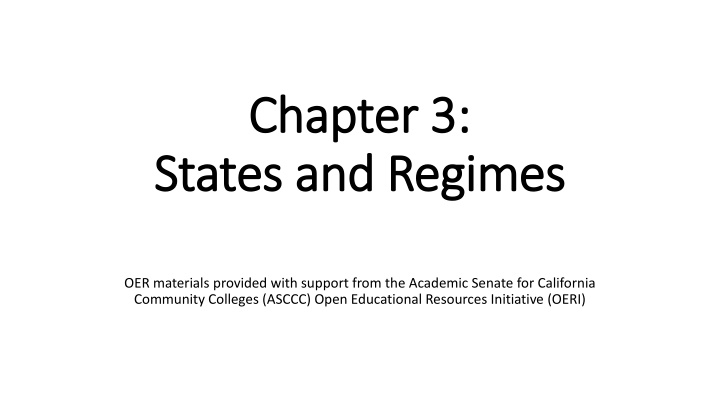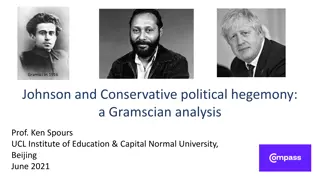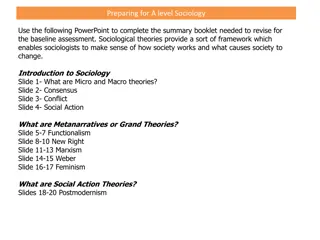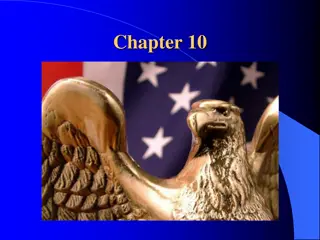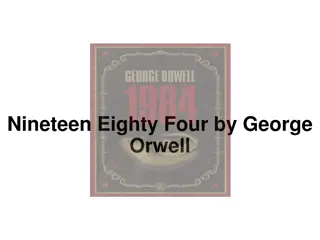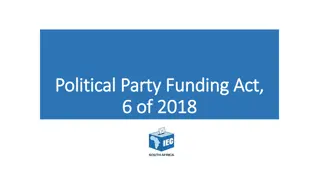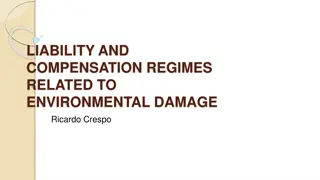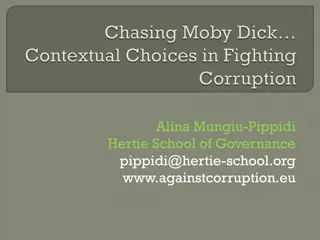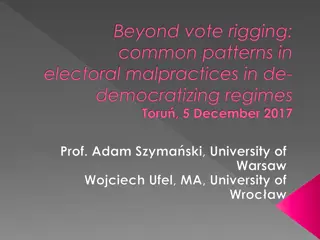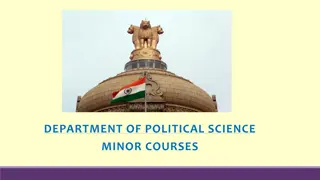Introduction to States and Regimes: An Analysis of Political Theories
An examination of political theories through the works of Thomas Hobbes, John Locke, and Jean-Jacques Rousseau. Explore concepts of anarchy, social contract, natural rights, and societal structure within states and regimes.
Download Presentation

Please find below an Image/Link to download the presentation.
The content on the website is provided AS IS for your information and personal use only. It may not be sold, licensed, or shared on other websites without obtaining consent from the author.If you encounter any issues during the download, it is possible that the publisher has removed the file from their server.
You are allowed to download the files provided on this website for personal or commercial use, subject to the condition that they are used lawfully. All files are the property of their respective owners.
The content on the website is provided AS IS for your information and personal use only. It may not be sold, licensed, or shared on other websites without obtaining consent from the author.
E N D
Presentation Transcript
Chapter 3: Chapter 3: States and Regimes States and Regimes OER materials provided with support from the Academic Senate for California Community Colleges (ASCCC) Open Educational Resources Initiative (OERI)
Chapter Outline Section #3.1: Introduction to States Section #3.2: The Modern State and Regime Types Section #3.3: Comparative Case Study - Botswana and Somalia
Section 3.1: Introduction to States
3.1 Introduction to States and Regimes Anarchy is defined as a lack of societal structure and order, where there is no established hierarchy of power. A social contract is defined by either a formal or informal agreement between the rulers and ruled of a society wherein the ruled submit to the laws of the rulers in exchange for certain benefits. Voluntary Involuntary Implicit Naturalization is the process by which noncitizens formally become citizens of the country they reside in.
3.1: Thomas Hobbes Thomas Hobbes Hobbes acknowledged that all people act within their own self- interest, and in acting in their own self-interest, will make calculations to ensure their survival. Image Text: Oil painting of Thomas Hobbes by artist John Michael Wright (1617- 1694) (Source: Thomas Hobbes, Line engraving by W. Humphrys is licensed under CC BY 4.0)
3.1: John Locke John Locke Locke set out the principles of natural rights, where he believed that all people were born with certain, unalienable rights Image Text: Portrait of John Locke by artist Godfrey Kneller Portrait of John Locke, 1697. (Source: John Locke, by Godfrey Kneller is licensed under CC01 - Universal Public Domain)
3.1: Jean-Jacques Rousseau Jean-Jacques Rousseau In this publication, Rousseau continues the discourse on social contract theory and argues that society does not lend itself to equal and equitable treatment of those within society. Image Text: Portrait of Jean-Jacques Rousseau by artist Maurice Quentin de La Tour (1704-1788) (Source: Jean-Jacques Rousseau by Maurice Quentin de La Tour is licensed under CC01 - Universal Public Domain)
3.1.2 Defining Terms A state is defined as a national-level group, organization or body which administers its own legal and governmental policies within a designated region or territory. A nation can be broadly defined as a population of people joined by common culture, history, language, ancestry within a designated region of territory. A country is a nation, which may have one or more states within it, or may change state-type over time. Feudalism was a system or social order that arose out of the middle ages, particularly in Europe, wherein peasants (sometimes called Serfs) were forced to provide members of the upper class with their crops, produce, goods as well as their services, fealty and loyalty.
3.1.2 Defining Terms, Continued Sovereigntyis the ability to manage the country s affairs independently from outside powers and internal resistance. If a state does not have the ability to manage its own affairs and issues, it will not be able to maintain its power over what happens. Power is the ability to get others to do what you want them to do. Soft power means being able to get others to do what you want them to do using the methods of persuasion or manipulation. Hard power is the ability to get others to do what you want using physical and potentially aggressive measures, for instance, like fighting, attacking or through war.
3.1.2 Defining Terms, Continued Again Legitimacy can be defined as the state s ability to establish itself as a valid power over its citizens. Authority is another important piece of a state s existence. Authority is defined as having the power to get things done. If we put these two terms together, a state is legitimate in its operations if it has the authority to make decisions and carry out its policy goals. Constitutions can be understood as a state s described laws of the land. Authority and legitimacy can be consolidated and, if accepted by the people, it becomes the operating manual and handbook for how society should run.
Section 3.2: Modern States and Regime Types
3.2.1: Foundations Strong and Weak States Strong states are those which are able to work their political agendas effectively, to make sure basic political tasks are completed. Strong states are able to defend their territory and interests, collect taxes from the people, enforce laws, manage their economies, and promote civil and political stability within their domain. Regardless of where authority is derived, the state has legitimacy to act because the citizens have accepted the terms of the social contract. Weak states are those which are unable to perform basic political tasks, and unable to work the political agenda of the authority in charge. Weak states are typically unable to defend their territories and interests. Political capacity is defined as the ability of a state to use its power, as derived through authority and legitimacy, to get things done and promote its own interests.
3.2.2: Regime Types Dictatorships to Democracies Regime Type Number of People in Charge Examples Anarchy No one Monarchy One (Usually royal or bloodline) Jordan, Saudi Arabia, Medieval England Dictatorship One Libya, North Korea, Cuba Aristocracy A few (Usually an elite, small, ruling class) Ancient Sparta Oligarchy A few (Usually wealthy elites) Renaissance Venice Junta A few Military Officers (Usually high- ranking officers) Chad, Guinea Democracy Many or All United States of America, Britain, Germany
3.2.3: Regime Transitions Regime transitions occur when a formal government changes to a different government leadership, structure or system. Sometimes, a regime will change from a dictatorship to a democracy through the mobilization of citizens demanding change from their state operations. Other times, a democracy may backslide into a dictatorship.
Section 3.3: Comparative Case Study: Botswana and Somalia
3.3.1: Comparative Case Study: Botswana Scramble for Africa. History of Colonialism. Considered one of Africa s most stable Democracies, though problems exist, especially in relation to Civil Liberties. African Exception? Political map of Botswana. (Source: Map of Botswana by CIA World Factbook is licensed under Public Domain)
3.5 Comparative Case Study: Somalia Scramble for Africa. Different experience under Colonial Rule; less local power given. From State, to Stateless. Continuing war and social disruption. Political Map of Somalia. (Source: Map of Somalia by CIA World Factbook is licensed under Public Domain)
3.5 Comparative Case Study Summation Although both countries were deeply affected by the Scramble for Africa, one of the key differences may have been the way in which the colonial governments left the respective regions. While the British largely left Botswana to its own devices, Somalia did not have the same luck. Instead, Somalia had been initially dominated partly by Italy and partly by Britain. In time, Somalia was also affected by World War I and World War II in ways Botswana was not. The persistence disruptions and foreign interventions faced by Somalia left it fragile and more difficult to breakaway.
Summary of Chapter 1. A state is defined as a national-level group, organization or body which administers its own legal and governmental policies within a designated region or territory. Social contracts and state authority are not the same everywhere. Modern states can fall into the categories of strong and weak states. Strong states are those which are able to work their political agendas effectively, to make sure basic political tasks are completed. Weak states are those which are unable to perform basic political tasks, and unable to work the political agenda of the authority in charge. Political capacity is the ability of a state to use its power, as derived through authority and legitimacy, to get things done and promote its own interests. Although Botswana and Somalia have a number of geographic and historical circumstances in common, the resulting political outcomes were very different. Botswana is considered to have one of the oldest and most stable democracies in Africa, while Somalia does not have a consolidated government authority that has widespread approval of the population. 2. 3. 4.
